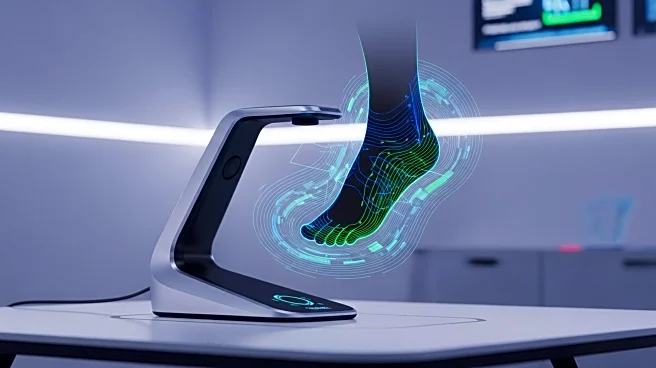What's Happening?
SelfScan3D has introduced a groundbreaking iOS app that allows consumers to create custom orthotics at home, utilizing technology trusted by over 1,500 podiatrists. The app captures over 25,000 data points per foot, enabling the creation of medical-grade insoles at significantly reduced costs compared to traditional methods. This innovation addresses a critical gap in the healthcare market, where custom orthotics typically require multiple doctor visits and can be expensive. The app offers a direct-to-consumer model, providing savings of up to 70% while maintaining professional quality standards. The orthotics are designed to alleviate foot, knee, and hip pain, and improve posture alignment, reflecting the company's holistic approach to foot health.
Why It's Important?
The launch of SelfScan3D's app is significant as it democratizes access to professional-grade foot care, making it more affordable and convenient for consumers. This development is particularly relevant in the context of rising healthcare costs and the increasing demand for remote health solutions. By eliminating the need for multiple doctor visits, the app reduces financial barriers and provides a viable alternative for individuals seeking relief from foot-related issues. The technology also highlights the potential for remote healthcare tools to deliver quality care, aligning with broader trends towards telemedicine and consumer-driven health solutions.
What's Next?
SelfScan3D plans to continue refining their platform based on user feedback and technological advancements. The company is committed to expanding access to effective foot care solutions, regardless of geographic location or financial constraints. As consumer demand for convenient healthcare options grows, SelfScan3D's app could pave the way for further innovations in remote health technology, potentially influencing how other non-emergency health concerns are addressed outside traditional medical settings.
Beyond the Headlines
The introduction of SelfScan3D's app may have broader implications for the healthcare industry, particularly in terms of accessibility and cost-effectiveness. By providing a high-quality, affordable alternative to traditional orthotics, the app challenges existing healthcare models and could inspire similar innovations in other areas of medical care. Additionally, the app's success could encourage further investment in remote health technologies, potentially leading to a shift in how healthcare services are delivered and accessed.












